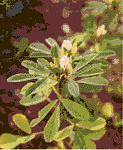Fenugreek
| |
Egyptology Articles
Herbs and Aroma
Alternative
Medicine
Aroma Therapy
|
|
.This
plant is also used
commonly both as a
food and spice, being one of the aromatic herbs, it is used in traditional
medicinal uses. It is very much well known in Egypt for a long time ago.
Egyptian
papyri mention the plant as one necessary for the mummification process.
Its common name is fenugreek or Greek hay seed or bird’s foot. Its botanical
name is
Trigonella foenum-graecum.
Its arabic name is Hilba, hilbeh.
The parts used are mostly the seeds. However, sometimes the fresh leaves
are used in cooking by Indians or dried and used as flavoring.
It is indigenous
to the eastern Mediterranean countries, India and Africa, even up to China.
A wide range of uses were
found for fenugreek in ancient times. Medicinally it was used for the treatment
of
wounds, abscesses, arthritis,
bronchitis, and digestive problems. Traditional Chinese herbalists used it
for kidney problems and conditions affecting the male reproductive tract.
Its name is taken
from Latin Trigonella which corresponds to the Greek
trigonon meaning “triangle”, probably refering to the triangular shape
of the flowers. The Latin species name foenum graecum means “Greek
hay”, referring to both the intensive hay fragrance of dried fenugreek herb and
its Eastern Mediterranean origin.
The herb is bitter and aromatic.
Dry roasting can
enhance the flavour and reduce the bitterness, provided care is taken not to
overheat the seeds.
|
 |
| |
Fenugreek |
|

|
|
Fenugreek Seed |
Its main constituent is mucilage, two alkaloids trigonelline
and choline- phosphates, lecithin and nucleoalbumin. Its essential oil is quite
minute in quantity but contains many components such as
n-alkanes, sesquiterpenes, alkanoles and lactone and many others.
Fenugreek seeds contain
alkaloids and proteins, and is high in lysine and L-tryptophan, as well as
containing substances called steroidal saponins and mucilaginous fibre. The
saponins and fibre are thought to be responsible for many of the benefits of
Fenugreek. The steroidal saponins are thought to inhibit cholesterol absorption
and synthesis.
Uses.
In
medicinal uses a preparation where seeds are soaked in water until they swell
and form a thick paste is used to prevent fevers, is comforting to the stomach
and has been utilized in diabetes. In combination with conventional medicine
e.g. insulin, it is helpful in gout, diabetes and neurasthenia.
The saponins are thought to
inhibit cholesterol absorption and synthesis, and may also have a positive
effect on blood sugar control in people who suffer from diabetes. In terms of
weight control, the soluble fibre in fenugreek seeds can reduce dietary fat
absorption by binding to fatty acids as well as create a sensation of "fullness"
and reduced appetite. Thus it is
a good agent for reducing serum cholesterol.
The herb affects cholesterol
levels in the same fashion as Pectin. Fenugreek also contains saponins. The
saponin-containing plant fibres could inhibit the intestinal absorption of
cholesterol much the same as Alfalfa saponins do (i.e. by absorbing bile acids
and increasing the loss of bile acids by fecal excretion, which then leads to an
increased conversion of cholesterol into bile acid by the liver).
It is a very well known
galactogogue, which is widely used in folk medicine from a very long time ago.
Fenugreek seeds are also
considered one of the cleansing herbs used on the body to eliminate built up
waste materials, toxins and fat from the arteries.
Fenugreek is also used in
anaemia as it contains good amount of vitamin B. Also used in rickets and
scrofula.
Alcoholic tinctures are used to
prepare emollient cream, ointments and plasters while the mucilage is use
externally as a poultice for skin infections such as abscesses, boils and
carbuncles.
It is administered as a
poultice, ointment, infusion or tincture.
Fenugreek is
very widely used as culinary herb and considered safe as a food supplement. It
is used as a flavoring for both human and animal feed. However, because
fenugreek has potential uterine stimulating properties which could potentially
lead to miscarriage, it should not be used during pregnancy in any form.
|
You may freely reprint this article
or place it on your website by
adding this statement: Courtesy of www.kingtutshop.com
|

